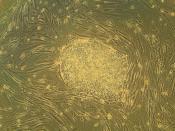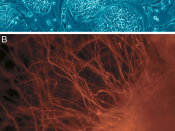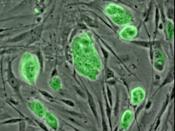Stem Cell Research: Moral or Immoral
By: Amy Rector
English 111
First of all to write this paper I feel I need to explain stem cell research. Stem cells have two important characteristics that set them apart from other types of cells. First, they are unspecialized cells that renew themselves for long periods of time through cell division. The second is that under certain experimental conditions they can be induced to become cells with special functions such as the beating cells of the heart muscle or the insulin-producing cells of the pancreas. It has been hypothesized by some scientists that stem cells may, at some point in the future, become the basis for treating diseases such as Parkinson's disease, diabetes, and heart disease.
Parkinson's disease is a very common neurodengenerative disorder that effects more that 2% of the population over 65 years of age. PD is caused by the loss of the dopamine producing neurons which leads to tremors, rigidity, and hypokinesia.
It is thought that PD may be the first disease to be amendable to treatment using stem cell transplantation. Several laboratories have been successful in developing methods to induce embryonic stem cells to differentiate into cells with many of the functions of DA neurons.
Several recent studies underline stem cell research as a basis for critically needed therapies for Type I diabetes. Insulin-producing cells have already been created in embryonic stem cells from mice and using embryonic cells from humans. Further research will be investigated.
Stem cell research offers good promise to those who suffer from degenerative heart disease. For example, it may help generate new, healthy heart tissue, valves and other vital tissues and structures. About 128 million people suffer from diseases that might be cured or treated through stem cell research. About 58...


